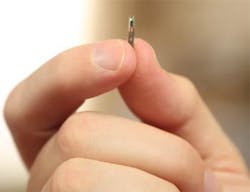If you’ve ever thought that management thinks of its employees as cattle, this news won’t necessarily change your mind. Just as cattle ranchers have longbeen using RFID technology to tag their animals, a technology company known as Three Square Market (32M) has begun implanting microchips in its human employees.
These chips, however, are said to be not trackable, are completely optional and will only contain information the user opts to include. Furthermore, the chip does not have GPS capabilities.
So what’s the point of the chip? Convenience, according to Todd Westby, 32M’s CEO. The RFID technology will allow employees to make purchases in the company’s office break room, open doors, use copy machines, log into their office computers, and other tasks. The company expects roughly 50 employees will initially choose to be voluntarily chipped.
32M is partnering with BioHax International, a Swedish RFID developer, on the technology.
RFID uses electromagnetic fields to identify electronically stored information. The chip implant uses near-field communications (NFC), the same technology used in contactless credit cards and mobile payments. A chip is implanted between the thumb and forefinger underneath the skin within seconds.
32M’s business focuses on break room markets, also known as micro markets, which is a kind of mini-convenience stores located in a company’s break room where employees can use self-service kiosks to make food and other purchases.
“We see chip technology as the next evolution in payment systems, much like micro markets have steadily replaced vending machines,” Westby says.
32M, in effect, is using RFID technology at its own company as a kind of loss-leader to jumpstart interest at convenience stores, fitness centers and other outlets to use 32M’s self-service applications. The RFID chip doesn’t have to be implanted, the company also notes—it can be worn in a wristband or similar device.





